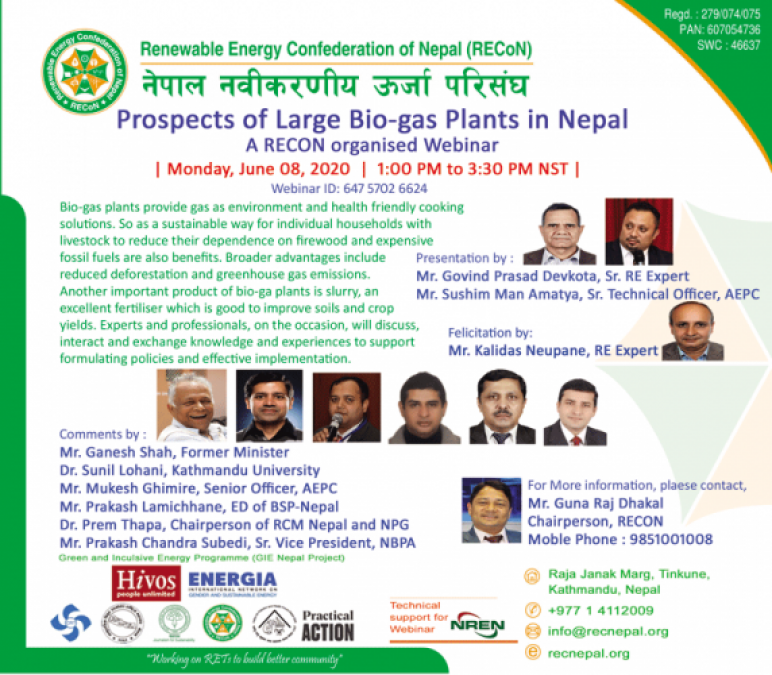
With aim to exchange knowledge, experiences and views of experts and professionals on promotion and development of Large Bio-gas Plants in Nepal, Renewable Energy Confederation of Nepal (RECON) organised a webinar on Monday, June 08, 2020. The guests, experts and professionals participated in the online event elaborated on technicality, operationalisation, financial aspects, utilisation and benefits of Large Bio-gas Plants.
Bio-gas plants provide gas as environment and health friendly cooking solutions. So as a sustainable way for individual households with livestock to reduce their dependence on firewood and expensive fossil fuels are also benefits. Broader advantages include reduced deforestation and greenhouse gas emissions, and improved public health as indoor air pollution - a major cause of illness and premature deaths - is reduced.
Another important product of bio-gas plants is slurry, an excellent fertiliser which is good to improve soils and crop yields. A large number of bio-gas plants of bigger size can support reducing use of chemical fertiliser while Nepal government spends 9 billion rupees per annum as subsidy on chemical fertiliser.
Moreover, large size bio-gas plants help manage municipality waste, agriculture waste, forest waste and the waste produced in livestock farms, poultry farms and so on as they are the input materials to produce gas for cooking and bio-fertiliser for farming.
Normally, plants more than 12 cubic metres in capacity fall under big size plant category in Nepal. It is the advancement in Nepal's bio-gas technology achieved via the long- term practices on modified GGC 2047 model and the learning from the international technological practices.
Sr. RE Expert Mr. Govinda Prasad Devkota and Sr. Technical Officer at Alternative Energy Promotion Centre (AEPC) Mr. Sushim Man Amatya elaborated the facts and figures of Large Bio-gas Plants, the current status, ongoing processes and future scenario with way out measures to be taken for the successful operationalisation of Large Bio-gas Plants. Mr. Devkota also elaborated that in the past the slurry come out from bio-gas plants were taken to tests to use as fertiliser and also studied the comparison with use of chemical fertilisers to different crops and locations.Mr Devkota further added that there is ample opportunity to go on large size biogas plant in the country, however improvement on existing type of GGC 2047 needed and more research integrated approach is needed. Likewise, Mr. Amatya stated that market position for the bio-gas should be taken into consideration for the future scenario which may be overshadowed by the oversupply of electricity.
Former Minister and Advisors' Committee Coordinator Mr. Ganesh Shah said that entrepreneurship development is a must for Large Bio-gas Plants to be profitable. Likewise, research and development also is another need to explore the best of technologies for Nepal's context and to be optimised the cost and benefit. Therefore, concerned ministries should be well coordinated on their roles and mandates. So as government, academia and private should work together for the best of fruitfulness, he stressed. Mr. Shah also stressed on the need of coordinating with global funding institutions for investing in renewable energy promotion movements.
Renewable Energy Expert Prof. Dr. Jagannath Shrestha emphasised that Nepal should put effort on creating a Centre of Excellence of biogas technologies in Nepal. The government agencies including Alternative Energy Promotion Centre (AEPC), Kathmandu University, Tribhuvan University, Private sector should be working together to make it happen. The place will be a learning centre where stakeholders would work on knowledge development. The state of the art equipments available should be well place to add value to the centre of excellence, he opined.
Executive Director of Biogas Sector Partnership Nepal Mr. Prakash Lamichhane said R and D, knowledge integration with entrepreneurship is needed for the promotion of present situation when demand in the domestic market and even in some other countries is favourable for Nepal's expertise.
Associate Professor at Kathmandu University Dr. Sunil Lohani said there is need of coordination among stakeholders for theoretical knowledge to translate into implementations. AEPC, universities and private to work together will be good for all. He added we have more to do for the R and D. The expertise available in Nepal presently should be well utilised he, opined.
Permaculture specialist Dr. Prem Thapa said the slurry produced from bio-gas plants and bio-char blended with slurry should be well experimented. The organic inputs will be better for the agriculture. So as use of waste materials such as animal waste, agriculture waste, forest waste, municipal waste and so on to bio-gas plants are environmental benefits.
Officiating President of Biogas Promotion Association Nepal Mr. Prakash Subedi said that number of installed domestic size bio-gas plants are in progress. That will reach to 500,000 soon. However, the cost of large bio-gas plants are relatively high, so cost down mechanism should be explored. Due emphasise in research and development is a need of the day. Around 10,000 workers are engaged in the biogas sector before the lockdown situation. The sector will be able to offer jobs for 10,000 more if conducive environment is created, he added. Slurry as fertiliser should be subsidised for the well promotion as organic fertiliser produced by bio-gas plants, he argued.
SENIOR OFFICER (HEAD- BIO ENERGY)- at Alternative Energy Promotion Centre Mr. Mukesh Ghimire, through presentations, elaborated the government policy and programmes to promote bio-gas plants including large size plants. He also mentioned the supports being extended by development partners and emphasise on supporting entrepreneurship development. He also mentioned the support to be extended by GCF and other agencies.
RE entrepreneur Mr. Kushal Gurung said that government activities and initiation on by products of large bio-gas plants need to be incentivised. He also added that another by product discharged in the liquid form is also a good fertiliser for agriculture. This is another benefit of large bio-gas plants, he informed.
Finance expert Mr. Surya Prakash Hada said that the projects need to have loanable features so as cost minimising should be a point to ponder. The policy on subsidy on interest also need to be revisioned in a simpler terms.
Executive Director of TU RECAST Prof. Dr. Rameshwar Adhikari mentioned the academia concerns in research and development of technologies to make suitable in terms of user friendly and entrepreneur friendly. Stakeholders should be well coordinated with AEPC, the government's nodal agency for the needful acts including R and D, he added.
Former Dean of KU Prof. Dr. Bhola Thapa said that time has come to think on upscaling and shifting technologies. The universities, research organisations, government sector and private sector need to join hands for the future of technologies to explore and applicate. He opined that the theme Hydro to Hydrogen should be a guideline to move forward for the goals to gain in future.
RE and Gender expert Dr. Indira Shakya said that the theories established in the past are worth to review in the changed context. More to be taken through users' perspective, she opined. Institutional capacity to addresses that gaps in different aspects related to large bio-gas plants and other technologies should be considered. Likewise, well utilisation of fund generated from CDM and other sources.
RE expert Mr. Prakash Aryal said involvement of academic institutions in R and D should be taken into consideration. Likewise, software developed in other countries may be introduced to utilise in Nepal to better performance.
Mr. Mahendra Chudal, Mr. Madav Regmi and Mr. Bharat Raut also spoke on the occasion.
The webinar was facilitated by RE expert Mr. Kalidas Neupane and presided over by Chairperson of RECON Mr. Guna Raj Dhakal.
The confederation recently had conducted webinars in (1) RE for Agriculture, (2) Small and Micro Hydropower: Challenge and Opportunities, (3) Use of Bio-char to revitalise soil quality for agriculture, (4) Youth and Self-Employment and Role of Renewable Energy, and (5) Prospects of Mini-grid in Nepal.




